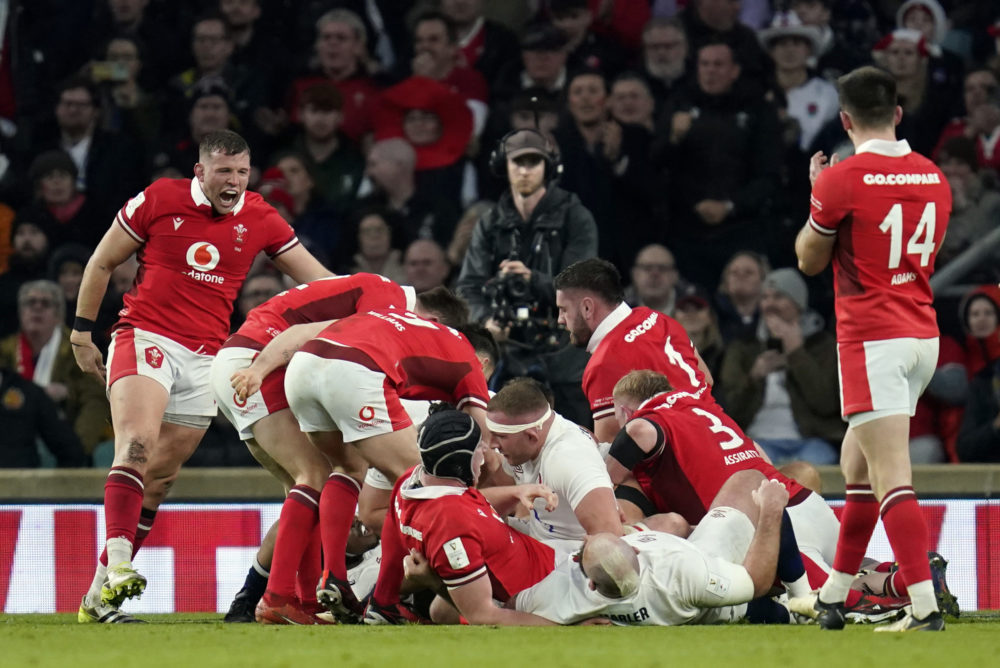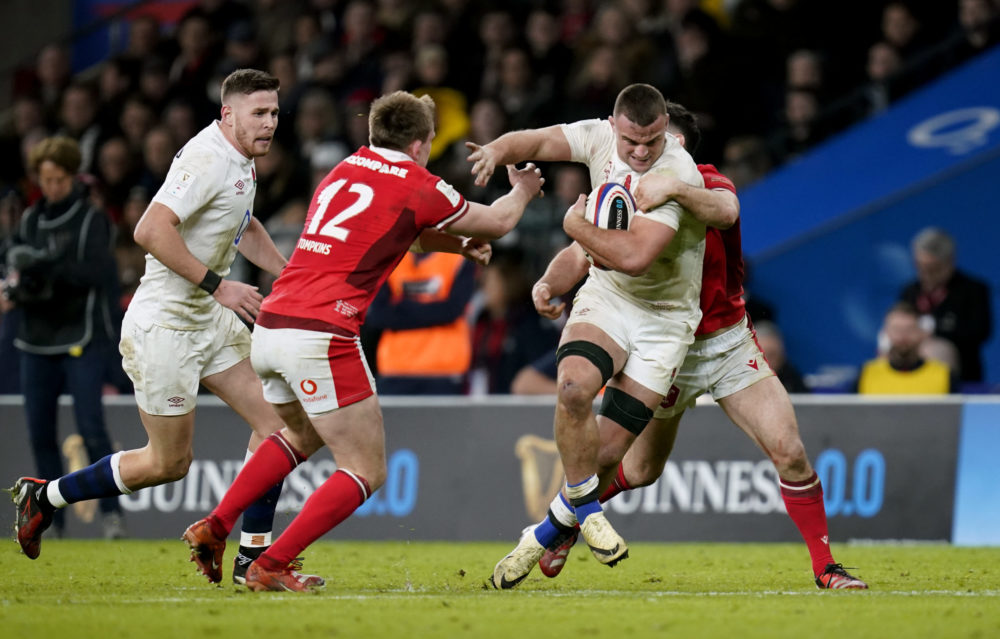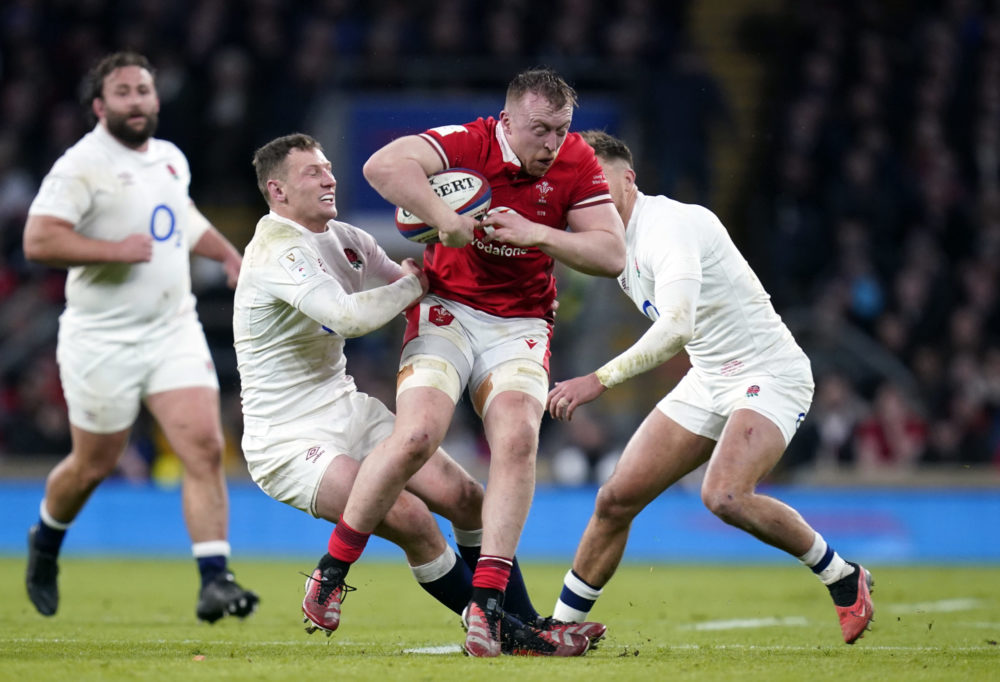Why Wales’ performances should be viewed as a work in progress

Simon Thomas
England 16, Wales 14
Two games in and it’s difficult to know quite what to feel about Wales’ Six Nations campaign so far.
We’ve had two defeats, two tales of what could have been, yet probably more positives than most people would have expected going into the Championship.
So there’s disappointment and frustration over the losses, yet also a fair degree of optimism about the future.
It really has been a switchback ride and a potent cocktail of emotions.
When it was 27-0 to Scotland early in the second half last week – with a trip to Twickenham to come – most Welsh fans would have gladly accepted defeats by just one and two points respectively in the opening games.
Yet there’s also a realisation that it could have been two wins, but for a few decisive moments.
So passing a definitive judgement on the new Wales is a work in progress, much like the team itself.
Coach Warren Gatland is clear in his own mind where things lie.
“We are going to be a good team. It’s just going to take a little bit of time,” he says.
Yesterday’s game against England was very much a reversal of the pulsating Principality Stadium showdown in Round One.
Against the Scots, Wales were wretched in the first half and captivating in the second, yet couldn’t quite complete the comeback to end all comebacks.
At Twickers, they were excellent in the opening 40 minutes as they built a 14-5 interval lead, but just weren’t able to see the job through after the break.
So we await an 80 minute performance. One thing for sure, it’s going to be needed if they are to have any chance of beating reigning champions Ireland in Dublin in two weeks’ time.
Now that really would exceed expectations.
For now, it’s a case of mulling over the plusses and minuses to date.

There were certainly plenty of plusses to take out of yesterday’s first half.
There was the way this young Welsh team held firm in the face of an early onslaught from England and then took their scoring chances when they came.
Their first entry into the opposition 22 – on 16 minutes – produced a penalty try courtesy of a fast-moving maul drive off an Aaron Wainwright lineout take.
Then, just before the break, they carved out a really well constructed score for flanker Alex Mann. That’s now two in two from the rookie blindside who is having some start to his international career.
Staying with the positives from the first half, Wales’ set piece was pretty solid, while Ioan Lloyd’s pinpoint cross kicking was a clear pre-game tactic well executed.
Then there was their discipline. It was simply immaculate, with not a single penalty given away.
As ITV pundit Dan Biggar rightly said, that was “absolutely incredible” – all the more incredible when you consider they had achieved the same in the second half against Scotland, making it 80 minutes of rugby without conceding a penalty.
Yet, on the flip side, there was also an example of the kind of naivety you are going to get from such a fresh-faced side.
When flanker Ethan Roots was yellow carded for the penalty try offence of bringing down the surging Welsh maul, England were suddenly down to 13 men, with lock Ollie Chessum already in the sin bin for shoulder to head contact on prop Keiron Assiratti.
It was an opportunity for Wales to fill their boots and pull well clear, but they proceeded to lose the period both opponents were off the field 5-0.
Perhaps getting a bit over-excited, they looked to run from their own line and fly-half Lloyd was snared by Maro Itoje to set up the five metre scrum from which No 8 Ben Earl powered over for the 13 men.
A lesson learned that there’s a time and a place.
Nevertheless, Wales put that setback behind them to secure a half-time lead at Twickenham for the first time in Six Nations history.
Could the long 12 year wait for a win at the home of English rugby be about to come to an end?
Sadly, it wasn’t to be.
So why did the game slip away? Well, there are a number of reasons, but the set-piece was the biggest issue.
The line-out, which had been an area of real strength in the first half, began to go awry, with replacement hooker Ryan Elias unable to hit his targets in the way Elliot Dee had.
As for the scrum, that also deteriorated amid a stark contrast in Test experience with the respective propping subs.
While England’s replacement duo of Ellis Genge and Dan Cole had 166 caps between them, Wales’ pair – Corey Dowachowski and Archie Griffin – tallied just seven.
It was a particularly testing assignment for debutant tighthead Griffin. He is yet to start a Premiership match for Bath, yet here he was up against one of the best looseheads in the business in Genge.
So it perhaps wasn’t that surprising that the English old hands should get on top.
Their dominance really told around the hour mark as two scrum penalties in quick succession helped take play from one end of the field to the other, culminating in centre Fraser Dingwall crossing in the corner after the defence had been sucked in by persistent pummelling.

With the set piece having been going pretty well, there will be questions raised over Gatland’s decision to take off Dee and tighthead prop Keiron Assiratti after just 55 minutes, with starting loosehead Gareth Thomas soon joining them on the sidelines.
Fresh legs is one thing, but there is also the argument that if it ain’t broke, don’t fix it.
Either way, the changes – by both teams – were to see a definite change in momentum.
In addition to their set-piece now struggling, Wales were also increasingly losing the aerial battle, as England turned to a kicking game with their 6ft 5ins full-back Freddie Steward ruling the skies, while the penalty count swung right round.
Put together, these issues meant the visitors just couldn’t secure any kind of territorial foothold in the second period and found themselves under mounting pressure.
That pressure finally told ten minutes from time.
Key moments win matches and that moment was delivered by England No 10 George Ford, who put in a majestic 50-22 kick to set up an attacking line-out.
Off that set-piece, Welsh replacement Mason Grady was guilty of deliberating knocking on Ford’s pass, earning him a yellow card and the hosts a penalty which their fly-half slotted to put them ahead for the first time in the game.
There was still time for Gatland’s gang to edge back in front, but the closing stages produced further evidence of an area of their game that does need work.
In the first half, they went through 25 phases during one passage of attacking play around the English 22 line, but just couldn’t make any headway and eventually spilled the ball.
It was a similar story three minutes from time as they tried to reclaim the lead.
On this occasion, there were 20 phases, but they simply couldn’t get over half-way. In fact, they ended up going backwards and with no route through the white wall, Lloyd opted to chip over it only for the ball to be fielded by the ubiquitous Steward.
With that, their last hope had gone.
So they do have to address the fact that they tend to run out of ideas when they go through multiple phases, with their one-up carriers making little ground.
Then there’s the issue of squad depth. Now, admittedly, Wales have a number of players unavailable for a variety of reasons, but the respective benches were key to England’s victory and building a 1 to 23 Test outfit has to be a big focus for Gatland moving forward.
So those are the minuses, but let’s end on the plusses and the biggest of the lot was the performance of Tommy Reffell.

He’s renowned for his jackaling and his scavenging on the deck and there were a succession of superb examples of that, leading ITV commentator Nick Mullins to dub him “the human hoover”.
But what also shone through was his work in attack, most notably in the build-up to Mann’s try.
First he spotted a rare gap in the blitzing English rearguard, bursting through off a Nick Tompkins feed and stepping inside to make vital yardage.
Then, after the ball was recycled, he popped up once more, taking an inside tip pass from Gareth Thomas and again breaking the line before delivering a killer offload to Tomos Williams who sent the supporting Mann away.
Reffell was also the game’s top tackler, with 14, and did everything he possibly could to drag Wales back up off the floor in the dying minutes, winning the jackal penalty that set up their final attacking opportunity.
It was an immense all-round display from the Leicester openside, one which should really have earned him the Man of the Match award.
Speaking on ITV, Jamie Roberts summed it up, saying: “What a player and what a performance. He was unbelievable, right in the middle of everything.”
As for other individual plusses, George North had a strong carrying game on his return in the centre, Rio Dyer delivered another fine showing on the wing, while Dee is nailing himself down as first-choice hooker and the classy Cam Winnett is looking to the manor born at full-back.
Then, in terms of the collective, you can’t fault the effort or the commitment. This new-look side is busting a gut for the jersey.

Gatland is certainly suitably encouraged.
“I am proud of that performance. The players gave everything that we asked for,” said the Kiwi coach.
“I thought we showed some great character. It’s disappointing to lose, but this is a young side that’s just going to continue to improve.”
The final analysis comes from Dan Biggar who is making an impressive start to his new role as a pundit.
The former Wales fly-half delivered the most succinct of summaries as he explained how the match turned around.
“In the second half, England almost went back to type to win that game,” he said.
“They had spoken all week about entertaining, entertaining, entertaining, but what won them the game was their defence, their set-piece and their kicking game.
“We speak a lot about why do teams continually kick the ball. The last half hour of this game was a masterclass on how you kick the ball and how you apply pressure.
“England kicked with a purpose, with numbers and accurately.”
Biggar added: “Wales probably showed a little bit of inexperience towards the end.
“I have no doubt there is an absolutely brilliant team in there, but it will take a little bit of time.
“They should be really proud of that effort though.
“Wales have to continue with this. They can’t go back to what they had before. They have to keep backing these players and keep backing this style of play.
“The only way you improve and get better is more time in the seat, more time playing this new system.
“This Welsh team is not the finished article by any stretch. It’s at the beginning of its journey. They have to keep finding ways to build confidence, continuity and gain experience.”
As Biggar indicates, there is a need for patience and, it’s fair to say, this new Welsh team is earning our patience with their endeavours.
Support our Nation today
For the price of a cup of coffee a month you can help us create an independent, not-for-profit, national news service for the people of Wales, by the people of Wales.






Sure, it can be said Wales performance yesterday is a work in process, I agree, but there were established players still making schoolboy errors that caused so many problems. In the past Wales had issues with lineout throwing. And we were promised that it would be rectified. But still there are problems, as is slow ball from the ruck. Last World Cup watched Japan play and noticed how quick they recycled the ball. And where other nations have the ability to get the ball out of the ruck with speed keeping the attack free-flowing Wales for some reason continue to… Read more »
I think regarding the ruck , the English played to the limit of the rules, and the ref. Another ref could easily have given us multiple pens for infringements, but we will learn , and maybe in a year or two, it will be us taking advantage. Learning the ” dark arts” comes with experience, and the days of clearing the ruck with the boot, are long gone.
I enjoy watching rugby but I am no expert. What I don’t understand is why Kieron Hardy didn’t do some longer passes from the rucks away from the action and away to a waiting Rio Dyer waiting on the wing. The short passes he did could have been just handed over to the next player. Then the recipient immediately ran into a brick wall of four or five opposing players. Why wasn’t the ball sent down the line to a more open field of play? What was that all about?